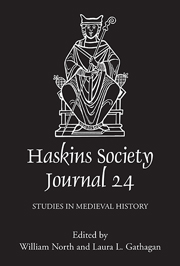Book contents
- Frontmatter
- Contents
- List of Figures
- Editor's Note
- Abbreviations
- 1 ‘Those Five Knights which you Owe me in Respect of your Abbacy’. Organizing Military Service after the Norman Conquest: Evesham and Beyond
- 2 Voluntary Ascetic Flagellation: From Local to Learned Traditions
- 3 The Material and the Visual: Objects and Memories in the Historia ecclesiastica of Orderic Vitalis
- 4 Anonymus Vaticanus: Another Source for the Normans in the South?
- 5 Christian Community and the Crusades: Religious and Social Practices in the De expugnatione Lyxbonensi
- 6 Godric of Finchale's Canora Modulatio: The Auditory and Visionary Worlds of a Twelfth-Century Hermit
- 7 Did Portugal Have a Twelfth-Century Renaissance?
- 8 Internal and External Audiences: Reflections on the Anglo-Saxon Archive of Bury St Edmunds Abbey in Suffolk
8 - Internal and External Audiences: Reflections on the Anglo-Saxon Archive of Bury St Edmunds Abbey in Suffolk
Published online by Cambridge University Press: 05 December 2013
- Frontmatter
- Contents
- List of Figures
- Editor's Note
- Abbreviations
- 1 ‘Those Five Knights which you Owe me in Respect of your Abbacy’. Organizing Military Service after the Norman Conquest: Evesham and Beyond
- 2 Voluntary Ascetic Flagellation: From Local to Learned Traditions
- 3 The Material and the Visual: Objects and Memories in the Historia ecclesiastica of Orderic Vitalis
- 4 Anonymus Vaticanus: Another Source for the Normans in the South?
- 5 Christian Community and the Crusades: Religious and Social Practices in the De expugnatione Lyxbonensi
- 6 Godric of Finchale's Canora Modulatio: The Auditory and Visionary Worlds of a Twelfth-Century Hermit
- 7 Did Portugal Have a Twelfth-Century Renaissance?
- 8 Internal and External Audiences: Reflections on the Anglo-Saxon Archive of Bury St Edmunds Abbey in Suffolk
Summary
Violent disorder broke out in various parts of England during the political turmoil of 1326–7 and included particularly severe rioting in the monastic towns of Abingdon, St Albans, and Bury St Edmunds in Suffolk. In January 1327 agitators from London roused the townspeople at Bury to conspire to attack and destroy the abbey of St Edmund. An armed mob forced entrance through the gates of the abbey on 14 January and seized and imprisoned the officials of the convent and several monks. They carried away all the treasures of the abbey, including the charters, muniments, and papal bulls from the sacristy and the treasury. Accounts of the legal process that followed the riots show the magnitude of the abbey's losses: in one, the monks alleged that the rioters had carried off three copies of a charter of King Cnut in their favour and four copies of a charter in Harthacnut's name. So denuded were the archives that the abbot had to pay the king to stay a suit against him in the royal courts, since he claimed the deeds he would have used for the defence of his case had been stolen by the rioters.
Rebels targeted Bury's archives again during the Peasants' Revolt in 1381. This time, however, they sought not to destroy the deeds but rather to consult them for evidence to substantiate some of their own claims. Like the authors of cahiers de doléance produced by the third estate in France in 1789, the rebels believed that the burdens of taxation and obligation had fallen less heavily on earlier generations, and that the abbey’s earliest charters would confirm their view. They thus demanded that the monks produce, ‘in the sight of the commons’, the charters of liberty for ‘the vill which Cnut, the founder of the monastery had once granted’. The monks duly brought out before the guildhall all the charters they could find and showed them to the mayor, the aldermen, ‘and a whole crowd of villeins’. When the rebels declared themselves unhappy with the documents produced by the abbey, the monks agreed to search their charters again to find the evidence for the liberties which St Edmund’s claimed; further, they promised that if they found none, they would produce new ones to serve the purpose.
- Type
- Chapter
- Information
- The Haskins Society Journal 242012 Studies in Medieval History, pp. 163 - 193Publisher: Boydell & BrewerPrint publication year: 2013



